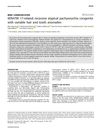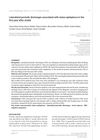 5 citations,
February 2012 in “Aesthetic Plastic Surgery”
5 citations,
February 2012 in “Aesthetic Plastic Surgery” A man developed skin cancer on his scalp after multiple artificial hair grafts.
 5 citations,
June 1994 in “Journal of Cutaneous Pathology”
5 citations,
June 1994 in “Journal of Cutaneous Pathology” No CD44 in alopecia areata, present in normal and androgenetic alopecia.
 4 citations,
September 2020 in “Frontiers in Microbiology”
4 citations,
September 2020 in “Frontiers in Microbiology” Algal oligosaccharides help prevent hair loss and promote hair growth.
 4 citations,
August 2020 in “Applied Materials Today”
4 citations,
August 2020 in “Applied Materials Today” Hydrogel microcapsules help create cells that boost hair growth.
 4 citations,
December 2019 in “Journal of Cosmetic Dermatology”
4 citations,
December 2019 in “Journal of Cosmetic Dermatology” Thread monofilament and minoxidil together increase hair growth in female androgenetic alopecia.
 4 citations,
January 2019 in “Dermatologic Therapy”
4 citations,
January 2019 in “Dermatologic Therapy” Scalp basal cell carcinoma may be more aggressive and harder to treat than other types, requiring special attention and further research.
 4 citations,
August 2013 in “Case reports in dermatology”
4 citations,
August 2013 in “Case reports in dermatology” A patient with total hair loss developed vitiligo after using a treatment called DCP.
 4 citations,
September 2011 in “Expert Review of Dermatology”
4 citations,
September 2011 in “Expert Review of Dermatology” Various treatments exist for alopecia areata, but none are completely satisfactory; choice depends on age, disease extent, and preference.
 4 citations,
January 2010 in “Acta dermato-venereologica”
4 citations,
January 2010 in “Acta dermato-venereologica” Low androgen levels can still cause female pattern hair loss.
 4 citations,
October 2007 in “Dermatologic Clinics”
4 citations,
October 2007 in “Dermatologic Clinics” Glucocorticoids and sex hormones affect skin health, with potential for targeted treatments to minimize side effects and treat skin conditions.
 4 citations,
June 2002 in “Clinical and experimental dermatology”
4 citations,
June 2002 in “Clinical and experimental dermatology” Effective treatment for hidradenitis suppurativa varies, with antibiotics commonly used and surgery as an option, but no single method is universally successful.
 3 citations,
September 2022 in “Archives of dermatological research”
3 citations,
September 2022 in “Archives of dermatological research” The fractional carbon dioxide laser is a safe and effective treatment for alopecia areata and works better than betamethasone valerate cream alone.
 3 citations,
June 2022 in “European journal of human genetics”
3 citations,
June 2022 in “European journal of human genetics” A new type of pachyonychia congenita linked to a specific keratin gene mutation was found in two Pakistani families.
 3 citations,
January 2019 in “Dermatology and therapy”
3 citations,
January 2019 in “Dermatology and therapy” Scalp massages may help stabilize or regrow hair in people suffering from hair loss, regardless of age, gender, or use of other treatments.
 3 citations,
January 2019 in “Skin appendage disorders”
3 citations,
January 2019 in “Skin appendage disorders” A woman with a rare scalp lymphoma had unusual hair loss after treatment.
 3 citations,
January 2019 in “Advances in stem cells and their niches”
3 citations,
January 2019 in “Advances in stem cells and their niches” Dermal papilla cells are key for hair growth and color, influencing hair type and size, and their interaction with stem cells could help treat hair loss and color disorders.
 3 citations,
December 2018 in “Meta Gene”
3 citations,
December 2018 in “Meta Gene” Certain gene variations increase male hair loss risk, influenced by hormone levels.
 3 citations,
May 2018 in “Biochemical and Biophysical Research Communications”
3 citations,
May 2018 in “Biochemical and Biophysical Research Communications” iNOS contributes to hair loss in obese diabetic mice and blocking it may encourage hair growth.
 3 citations,
June 2015 in “Serbian Journal of Dermatology and Venereology”
3 citations,
June 2015 in “Serbian Journal of Dermatology and Venereology” The conclusion is that cerebrovascular diseases can cause seizure-like activity in stroke patients, which can be improved with antiepileptic drugs.
 3 citations,
January 2012 in “Elsevier eBooks”
3 citations,
January 2012 in “Elsevier eBooks” The document says that there are treatments for hair and nail diseases.
 3 citations,
November 2010 in “Rheumatic Diseases Clinics of North America”
3 citations,
November 2010 in “Rheumatic Diseases Clinics of North America” Pregnancy can cause symptoms similar to rheumatic diseases, making diagnosis difficult, and affects various body systems, requiring careful distinction between normal changes and serious conditions.
 3 citations,
October 2007 in “Expert Review of Dermatology”
3 citations,
October 2007 in “Expert Review of Dermatology” Hair ages due to various factors and treatments like minoxidil and finasteride can help, but more research and better public awareness are needed.
 3 citations,
June 2006 in “Expert Review of Dermatology”
3 citations,
June 2006 in “Expert Review of Dermatology” The document concludes that hair loss is complex, affects many people, has limited treatments, and requires more research on its causes and psychological impact.
 2 citations,
March 2023 in “Frontiers in medicine”
2 citations,
March 2023 in “Frontiers in medicine” A 15-year-old boy's severe scalp condition improved significantly with adalimumab and baricitinib treatment.
 2 citations,
December 2019 in “Journal of The European Academy of Dermatology and Venereology”
2 citations,
December 2019 in “Journal of The European Academy of Dermatology and Venereology” Differences in gene expression and methylation patterns found in AGA patients suggest potential targets for future treatments.
 2 citations,
January 2019 in “Case Reports in Dermatology”
2 citations,
January 2019 in “Case Reports in Dermatology” A 66-year-old woman's thick scalp and hair loss were confirmed as lipedematous alopecia, a rare condition possibly influenced by genetics, with no effective treatment known.
 2 citations,
July 2018 in “Elsevier eBooks”
2 citations,
July 2018 in “Elsevier eBooks” Some supplements may help with hair loss, but there's not enough strong evidence to recommend them without doctor advice.
 2 citations,
May 2017 in “InTech eBooks”
2 citations,
May 2017 in “InTech eBooks” Stem cells could improve hair growth and new treatments for baldness are being researched.
 2 citations,
July 2014 in “Irish Journal of Medical Science”
2 citations,
July 2014 in “Irish Journal of Medical Science” The meeting discussed medical findings, including benefits of certain treatments for cancer and heart conditions, and highlighted issues like poor adherence to preventive measures and skill gaps among interns.
 2 citations,
February 2014 in “Hair therapy & transplantation”
2 citations,
February 2014 in “Hair therapy & transplantation” Alopecia Areata is an autoimmune condition causing hair loss, influenced by genetics, environment, and possibly improved by anti-MIF therapy, with many patients experiencing regrowth within a year.






























